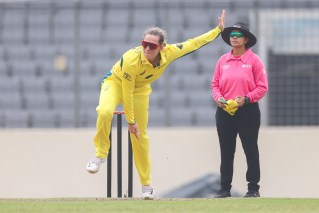Cricket World Cup: England beats New Zealand in stunning final


The International Cricket Council has announced the rules of the super over which saw England win the World Cup on boundaries are being changed. Photo: Getty
England broke its Cricket World Cup hoodoo in truly epic fashion on Monday morning, defeating New Zealand on a boundary count-back after regulation play and a super over could not separate the two sides in an unforgettable final at Lord’s.
A super over seemed a far-fetched prospect when England needed 22 runs to win off its last nine deliveries, but heroic batting from Ben Stokes (84 not out) and two barely believable fielding mishaps helped the victors finish on 241 all out, the same total posted by New Zealand (8-241).
The incredible finish forced a super over, in which both sides were given six deliveries – or two wickets – to score as many runs as possible.
Stokes and Jos Buttler smashed 15 runs from England’s over and New Zealand finished on exactly the same total, with Martin Guptill run out attempting a second run from the very last ball.
With both sides unable to be separated, England stunningly claimed the tournament via a boundary count-back, a rule that gives preference to the nation that scored the most boundaries during the match in the event that teams are tied after both 50 overs each and a super over.
England scored 24 boundaries in its innings, compared to New Zealand’s 16.
The two teams were aware of the rule before the super over started, with Guptill’s dismissal sparking wild celebrations among England players and fans, and setting off jubilant scenes across a country that was desperate for World Cup glory.
“Unbelievable isn’t it? I thought I’d seen everything in cricket and that game was just ridiculous, wasn’t it,” England wicket-keeper Buttler told Sky Sports.
🏆 The moment @englandcricket claimed @ICC @cricketworldcup glory ⬇️ #LoveLordspic.twitter.com/Se8MOedjWF
— Lord's Cricket Ground (@HomeOfCricket) July 14, 2019
England entered the tournament as favourites despite having lost all three previous World Cup finals it had contested, and victory will be a major boost to the side ahead of the much-anticipated Ashes campaign.
Stokes, awarded Man of the Match, said at the presentation: “I don’t think there’ll ever be a better game in cricket history than that.”
New Zealand has now lost the past two World Cup finals and the manner in which the final was decided was heartbreaking for the Black Caps.
It was, in truth, a match that no side deserved to lose, and a contest that will go down in the history books.
“The players are shattered at the moment. Obviously it’s devastating. They’ve performed at such a high level through the tournament,” New Zealand captain Kane Williamson said.
New Zealand won the toss and elected to bat, with Henry Nicholls (55) and Williamson (30) setting the platform with a cautious, steady and effective partnership.
The pair took the Black Caps to 1-103 in the 23rd over before Liam Plunkett (3-42) produced a desperately needed double strike, removing both set batsmen.
New Zealand’s frustrations grew as the likes of Ross Taylor (15), Jimmy Neesham (19) and Colin de Grandhomme (16) all failed to convert starts, before wicketkeeper-batsman Tom Latham provided a crucial 47 to push his side towards 250.
Chris Woakes (3-37) joined Plunkett as the pick of England’s bowlers but New Zealand’s total looked better and better as the match grew older.

Lockie Ferguson claimed three pivotal wickets. Photo: Getty
England slumped to 4-86 in its chase as de Grandhomme (1-25) proved an unlikely source of economy during the middle overs.
Stokes and Buttler (59) kept England in the contest with a sensational 110-run partnership, but the latter’s departure – one of three Lockie Ferguson wickets – could have been fatal at 5-196 in the 45th over.
Stokes continued to swing, though, and even when Plunkett (10) departed, leaving England needing 22 runs in one-and-a-half overs, the all-rounder did not let up.
His first slice of fortune came from the first ball after Plunkett’s dismissal, when Stokes holed out to Trent Boult at deep midwicket.
Boult took the catch but stepped on the rope shortly afterwards, meaning his throw back into play to a nearby fielder – which came after his error – counted for nothing.
It was a huge life for Stokes and saw England needing 16 from eight balls. That equation was soon reduced to 15 from four balls, but Stokes hit a six over mid-wicket before setting off for a quick two that incredibly turned into another six after a throw from the deep deflected off the England man and diverted away for four.
As the deflection came in Stokes’ dive to make his ground, it was considered above board, England’s requirement down to three runs from two balls.
Successive run outs forced a super over, though, only for Stokes and Buttler to set New Zealand a tricky tally.
Yet when Neesham hit two, six, two and two from the first four legal balls of New Zealand’s super over, three runs off two deliveries would have given the Black Caps victory.
A quickly taken single followed and with two needed off the last ball, Guptill and Neesham were unsuccessful in their bid to scramble back for a second.
A brilliant throw from Jason Roy was responsible, with Buttler whipping the bails off in a flash at the striker’s end to kickstart scenes of euphoria and ecstasy.








